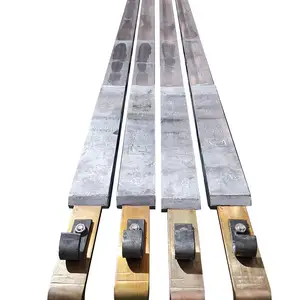

High Density Extruded Anode For Chromium Plating Lead Tin Antimony Alloy JJ70X25x3000 Electroplating Chromium Anode


Lead Tin Antimony Alloy High Density Extruded Anode For Chromium Plating JJ70X25x1000 Electroplating Chromium Anode













Cobalt chromium alloy, a high-performance material known for its exceptional strength and resistance to wear and corrosion, serves as a cornerstone in various industrial applications. This alloy, often enriched with molybdenum or nickel, is engineered to meet the rigorous demands of sectors including aerospace, dental, and orthopedic implants.
The cobalt chromium properties are notable for their biocompatibility and high wear resistance, making them ideal for medical implants. The addition of molybdenum enhances this alloy's strength and resistance to corrosion, resulting in the widely used cobalt chromium molybdenum alloy. In dentistry, the cobalt chrome dental alloy is prized for its durability and resistance to tarnishing, reflecting its suitability for long-term oral use.
Beyond medical use, cobalt chromium alloy finds its place in the manufacturing of gas turbines and jet engines due to its ability to retain strength at high temperatures. The chromium cobalt nickel alloy variant is particularly effective in environments that demand high-performance materials capable of withstanding oxidative and corrosive forces.
The versatility of cobalt chromium alloy extends to its manufacturability. It can be fabricated into complex shapes and forms, catering to custom requirements. The alloy's machinability allows for the creation of components with precise dimensions, essential for specialized industrial tasks.
In industries where material longevity is crucial, the cobalt chrome molybdenum alloy stands out. Its resistance to environmental factors such as temperature fluctuations and corrosive elements makes it a reliable choice for long-term applications.
Selecting the appropriate cobalt chromium alloy involves considering the specific environment and stresses the material will face. The chromium cobalt and nickel alloy offers a balance of high-temperature capability and corrosion resistance, while the nickel chromium cobalt alloy is tailored for situations requiring enhanced protective properties.